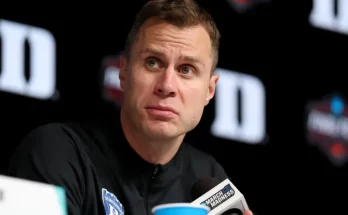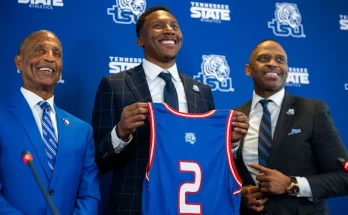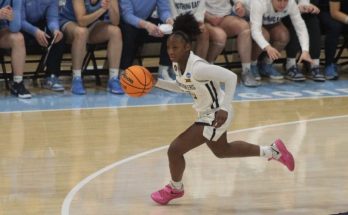Georges Niang is not walking into Boston with rose-colored glasses. He knows exactly what he’s stepping into—an emotionally volatile fanbase still reeling from the loss of Kristaps Porzingis, a man they affectionately dubbed “The Unicorn.” Porzingis, with his rare combination of height, skill, and finesse, had woven his way into the hearts of Celtics fans in short time. The news of his departure was met with a mix of disbelief, disappointment, and outright frustration. And now, in steps Georges Niang—the “Mini Van”—to replace him. It’s a nickname he proudly owns, and one that perfectly encapsulates his self-aware, workmanlike approach to the game. But in Boston, where sports legends are either revered or reviled, Niang knows he’s starting with a deficit in goodwill. And he doesn’t care.
“They don’t give a sh\*t if I’m from Boston,” Niang said with his usual dry wit and fearless honesty. “You just took our Unicorn and replaced it with a Mini Van… I’m like public enemy number one.” It’s classic Niang—funny, sharp, and painfully honest. While some players might tiptoe into a new locker room, especially one with the legacy and expectations of the Boston Celtics, Niang barrels in with a smile and a challenge: doubt me if you want, but you’ll see why I belong.
This is the duality of Georges Niang. He’s self-deprecating but ultra-confident. He jokes about being “the Mini Van,” but he plays like a bulldozer with a jump shot. He’s not here to be flashy; he’s here to work. He’s here to grind. And most importantly, he’s here to win. Because for all the talk of what the Celtics lost in Porzingis, Boston might have quietly gained something they’ve lacked in recent playoff runs: a consistent bench scorer who knows his role, never tries to do too much, and always hits the open shot.
At 6’7″, Niang isn’t built like your typical forward. He doesn’t have the wingspan of a shot-blocking machine or the vertical of a rim-runner. What he does have is an exceptional feel for the game, a silky-smooth shooting stroke from beyond the arc, and a chip on his shoulder the size of a Boston pothole. He’s been overlooked for most of his career, never considered the centerpiece, always the glue guy. And yet, time after time, he finds himself on winning teams, contributing in critical playoff moments. That isn’t a coincidence.
For Celtics fans unsure of what Niang brings to the table, look no further than his playoff track record. He’s played in high-leverage situations with teams like the Utah Jazz, Philadelphia 76ers, and Cleveland Cavaliers. He’s faced elite defenses, switched onto star wings, and been forced to hit shots with defenders breathing down his neck. Time and time again, he’s delivered. There are no illusions about what he is—a high-efficiency role player who spaces the floor, keeps the offense humming, and talks enough trash to keep the energy alive. He might not be the star, but he’s the one who makes life easier for the stars.
The Boston Celtics don’t need Niang to be a star. They have Jayson Tatum. They have Jaylen Brown. They’ve got Jrue Holiday, Derrick White, and Al Horford holding things down. What they need is depth. They need a guy who can come off the bench and knock down threes, who can match up defensively without being a liability, who can keep the ball moving and the tempo up. They need a guy who doesn’t flinch in hostile environments. Niang checks every one of those boxes—and he’s doing it while fully embracing the role of the villain.
Boston loves its heroes, but it loves its villains even more—as long as they produce. Kevin Garnett, Paul Pierce, and even Marcus Smart all took turns being the guy who stirred the pot, brought the fire, and gave the Celtics their edge. Niang’s brash confidence and unapologetic attitude are tailor-made for the city. He doesn’t need to be the loudest voice in the room, but when he speaks, it’s always with conviction. There’s no sugar-coating, no PR-polished soundbites—just raw, unfiltered belief in himself and his game.
It’s also worth noting that Niang isn’t coming into Boston blind. He’s familiar with the system, the coaches, and some of the players. He’s been a consistent adversary in the Eastern Conference wars, and he understands what it takes to compete with the best of the best. That familiarity breeds confidence. He knows what kind of effort and execution is required night in and night out. More importantly, he knows that in Boston, loyalty isn’t given—it’s earned through grit, sacrifice, and big shots in big moments.
Replacing Porzingis isn’t just about numbers. It’s about narrative. Celtics fans saw Porzingis as the missing piece—a perfect stretch big to complement Tatum and Brown. His injury-riddled postseason and subsequent departure felt like unfinished business. That’s the emotional burden Niang inherits. But here’s the twist: he’s not trying to be Porzingis. He’s trying to be Georges Niang, and that may be exactly what Boston needs.
There’s also something uniquely refreshing about a player who doesn’t try to curate his image to please the masses. Niang isn’t running from the “Mini Van” label. He’s leaning into it. He knows he’s not the flashiest guy on the court, but he also knows he’s dependable, durable, and gets the job done. In a league full of Ferraris and Lamborghinis, sometimes the Mini Van is the vehicle that gets your team to the Finals because it never breaks down. It’s a metaphor that fits his entire career—unassuming but essential.
And for those who think this is just a feel-good story with a quirky nickname, let’s look at the numbers. Niang has consistently shot over 40% from deep for much of his career. He moves without the ball, understands spacing, and rarely takes bad shots. In today’s NBA, where floor spacing is critical and bench units are often the difference between an early exit and a Finals berth, Niang is a weapon. He may not be the first option, but he’s always ready when called upon—and he delivers. That kind of reliability is rare and valuable.
Let’s not forget the locker room factor either. Niang brings levity. He brings humor. He’s the guy who can break the tension, keep things light, and help a team maintain its chemistry during the grind of a long season. In high-pressure situations, that matters more than people realize. Teams that stay loose, that enjoy each other’s company, that trust one another—that’s what builds championship culture. Niang adds to that culture.
Boston is a pressure cooker. The fans demand greatness. The media dissects every game, every minute, every rotation decision. And while some players shrink in that environment, Niang thrives in it. He relishes the opportunity to silence critics, to prove people wrong, to hear the boos and let them fuel him. That’s what makes him the perfect addition to this Celtics team. Not because he’s a unicorn. Because he’s real. Because he’s tough. Because he knows exactly who he is—and he’s not afraid to let the world know it.
So as Georges Niang prepares to suit up in Celtics green, don’t expect a tearjerker homecoming narrative. Expect fire. Expect swagger. Expect a guy who’s ready to embrace the hate and turn it into fuel. This isn’t about replacing Porzingis. This is about earning Boston’s respect the only way you can—through buckets, grit, and cold-blooded performances in April, May, and June.
Forget the glitz. Forget the glamour. This is a Mini Van with championship horsepower. And Boston might just find it’s exactly what they need.



